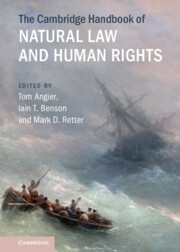Book contents
- The Cambridge Handbook of Natural Law and Human Rights
- The Cambridge Handbook of Natural Law and Human Rights
- Copyright page
- Contents
- Contributors
- Acknowledgements
- Introduction
- Part I Natural Law and the Origins of Human Rights
- Part II Natural Law Foundations of Human Rights Obligations
- Part III Natural Law and Human Rights within Religious Traditions
- 14 Natural Law, Natural Theology, and Human Rights in the Jewish Tradition
- 15 Natural Law and Human Rights in Catholic Christianity
- 16 Natural Law and Natural Rights in the Early Protestant Tradition
- 17 Human Rights or Moral Obligations?
- Part IV The Human Person, Political Community, and Rule of Law
- Part V Rival Interpretations and Interpretive Principles
- Part VI Challenges and Future Prospects
- Index
14 - Natural Law, Natural Theology, and Human Rights in the Jewish Tradition
from Part III - Natural Law and Human Rights within Religious Traditions
Published online by Cambridge University Press: 03 November 2022
- The Cambridge Handbook of Natural Law and Human Rights
- The Cambridge Handbook of Natural Law and Human Rights
- Copyright page
- Contents
- Contributors
- Acknowledgements
- Introduction
- Part I Natural Law and the Origins of Human Rights
- Part II Natural Law Foundations of Human Rights Obligations
- Part III Natural Law and Human Rights within Religious Traditions
- 14 Natural Law, Natural Theology, and Human Rights in the Jewish Tradition
- 15 Natural Law and Human Rights in Catholic Christianity
- 16 Natural Law and Natural Rights in the Early Protestant Tradition
- 17 Human Rights or Moral Obligations?
- Part IV The Human Person, Political Community, and Rule of Law
- Part V Rival Interpretations and Interpretive Principles
- Part VI Challenges and Future Prospects
- Index
Summary
This chapter argues that there are two basic approaches to natural law, especially but not exclusively in the Jewish tradition. In the first, natural law is essentially concerned with human goods. In the second, natural law is essentially concerned with human rights. The first approach is that of ‘natural theology’. The second approach is what is called here ‘normative theology’. For natural theology, natural law is rooted in a larger, beneficial, teleological Nature, ruled by the Creator-God. For normative theology, the ‘nature’ in natural law is human nature, which is essentially lawful, having been made in God’s image by the lawgiving Creator-God. The chapter analyses and critiques the first approach to natural law, while the second is analysed and its theological and philosophical preferability advocated. From a theological perspective, rights are more closely related to divinely commanded duties (mitsvot) than goods are. From a philosophical perspective, connecting natural law with human rights as divine entitlements avoids the problem of deriving prescriptions from descriptive states of affairs; a problem natural law based on natural theology does not seem able to overcome.
Keywords
- Type
- Chapter
- Information
- The Cambridge Handbook of Natural Law and Human Rights , pp. 205 - 217Publisher: Cambridge University PressPrint publication year: 2022

